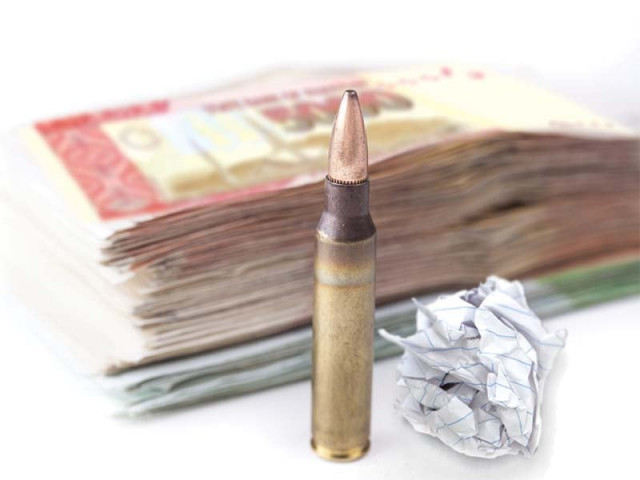Turning ‘hostile’: Man takes extortionist to court, fails to identify him later
ATC hears petition against man believed to be Baba Ladla's younger brother

DESIGN: FAIZAN DAWOOD
In August 2013, truck driver Abdur Rasheed had filed a complaint with the Mominabad police that he was receiving extortion calls from someone identifying himself as Zahid Baloch, the younger brother of notorious gangster Baba Ladla. The extortionist was demanding Rs300,000 as protection money from him but he ignored the calls.
A week after the first call, three men on a motorcycle approached Rasheed as he was sitting with his uncle inside the drawing room at his house in Orangi Town. One of the men called out Rasheed's name and asked him to pay Rs400,000 on the spot, claimed the complainant.
When Rasheed told them he did not have that much money, the suspects opened fire at him but he and his uncle remained unhurt. The police also came in and booked the suspect in two cases — demanding extortion and possessing illegal weapons.
The case was initially heard by the anti-terrorism court (ATC)-II, which transferred it to ATC-VII after framing the charge on the suspect. The case reached the indictment stage nearly a year after it was registered.
On Tuesday, the proceedings took an unexpected turn when ATC-VII judge Akhlaque Hussain Larik summoned the complainant to identify the suspect before him. Rasheed failed, however, to identify the suspect and claimed that it was not the same person who was arrested from the spot.
Listening to the complainant's testimony, the court prosecutor, Shoaib Khan, asked him if he had been threatened by the accused but Rasheed denied this. Khan also asked him if he had reached a compromise with the suspect but he denied this as well. Eventually, the prosecutor declared the complainant 'hostile'.
Khan told The Express Tribune that it is possible that the complainant reached a compromise with the accused outside the court. "That is why he gave this statement."
The court has the power to book a person on giving 'false evidence' under section 193 of the Pakistan Penal Code, he pointed out. But usually the court takes a lenient view in such cases, he added. Khan, who is also a prosecutor in the triple murder case of gangster Arshad Pappu, added that witnesses turned hostile as they perceived danger in most of such cases.
Published in The Express Tribune, April 29th, 2015.



















COMMENTS
Comments are moderated and generally will be posted if they are on-topic and not abusive.
For more information, please see our Comments FAQ